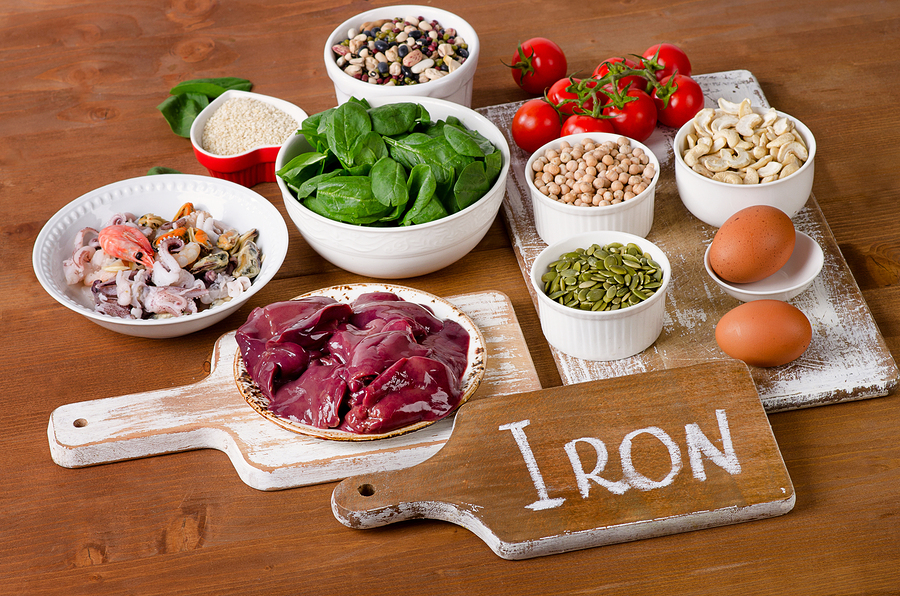Are you experiencing missed periods and wondering if low iron could be the culprit? It’s a common concern among women, and in this article, we’ll explore the link between low iron and missed periods. While the research is still developing in this area, there is evidence suggesting that severe iron-deficient anemia can cause your body to stop menstruating in order to conserve iron. Although the existing studies have been conducted on mice, about 50 percent of women with iron-deficient anemia also experience amenorrhea, the loss of periods. So, it’s clear that iron plays a crucial role in fertility and menstruation.
When your body lacks sufficient iron, it can lead to iron deficiency anemia, which can disrupt your menstrual cycle and result in missed periods. Hormonal imbalances caused by low iron levels can throw off the regularity of your periods. Moreover, the body may try to conserve iron by reducing the amount of menstrual bleeding, leading to lighter and shorter periods. In some cases, low iron levels can even cause the complete cessation of menstrual periods. So, if you’ve been experiencing irregular or missed periods, it’s worth considering whether low iron could be a contributing factor.
Heavy menstrual periods are a common cause of iron deficiency in women. Losing too much blood during menstruation and not being able to replenish it adequately can lead to iron deficiency anemia. Dr. Jacques Moritz, Director of Gynecology at Mount Sinai St. Luke’s Roosevelt in New York City, explains that some women go through a cycle of losing too much blood, partially replacing it, and then losing too much again the following month. This repeated pattern can deplete iron stores in the body, causing a variety of menstrual issues, including missed periods.

Contents
Can Low Iron Stop Your Period?
Low iron levels can indeed have an impact on your menstrual cycle. When there isn’t enough iron in your body, it can lead to a condition called iron deficiency anemia. This can cause hormonal imbalances that disrupt your menstrual cycle and potentially lead to missed periods. In some cases, severe iron-deficient anemia can even cause your body to stop menstruating altogether in order to conserve iron.
While research in this area is still ongoing, there is evidence to suggest that if iron-deficient anemia becomes severe, your body may stop ovulating, which is a crucial part of your menstrual cycle. However, it’s important to note that most of the research has been conducted on mice, so it’s not yet clear if the same applies to humans.
It’s worth mentioning that approximately 50 percent of women with iron-deficient anemia also experience amenorrhea, which is the loss of period. This further highlights the role that iron plays in overall fertility and menstruation.
In addition to potentially stopping your period, low iron levels can also lead to lighter and shorter periods. This is because the body may try to conserve iron by reducing the amount of menstrual bleeding. So if you’ve been noticing changes in the regularity, duration, or flow of your periods, it’s possible that low iron levels could be a contributing factor.
It’s important to remember that heavy menstrual periods are actually the number one cause of iron deficiency in women. When you lose a significant amount of blood during your period and don’t adequately replace it, iron levels can become depleted. This can create a vicious cycle where iron deficiency leads to heavy periods, which in turn further depletes iron levels.
While iron supplementation won’t necessarily make your periods lighter, it is still a sensible idea to replenish the iron stores in your body. In fact, a study showed that one year of iron supplementation increased hemoglobin levels in women treated for heavy menstrual bleeding.
Low iron levels can indeed have an impact on your menstrual cycle, potentially leading to missed periods and other disruptions. It’s important to pay attention to your iron levels and address any deficiencies to ensure the health and regularity of your menstrual cycle.
Understanding the Menstrual Cycle
The Connection between Low Iron and Missed Periods
Low iron levels can have a significant impact on your menstrual cycle, potentially leading to missed periods. Iron is an essential nutrient that plays a crucial role in the production of hemoglobin, a protein in red blood cells that carries oxygen to your body’s tissues. When your iron levels are low, your body may not have enough hemoglobin to support a regular menstrual cycle.
Severe iron-deficient anemia, which occurs when your body doesn’t have enough iron to produce adequate amounts of hemoglobin, can cause your body to stop menstruating in order to conserve iron. This is your body’s way of prioritizing its limited resources and ensuring that vital organs receive the oxygen they need. As a result, you may experience missed periods or irregular menstrual cycles.
How Iron Deficiency Can Affect Your Period
Iron deficiency can also lead to hormonal imbalances, which can disrupt the regularity of your periods. Hormones like estrogen and progesterone play a crucial role in regulating your menstrual cycle. When your iron levels are low, it can affect the production and balance of these hormones, leading to lighter and shorter periods.
In addition, heavy menstrual periods can also contribute to iron deficiency anemia and missed periods. Excessive blood loss during menstruation can deplete your body’s iron stores, making it harder for your body to maintain a regular menstrual cycle.
It’s important to pay attention to your iron levels and address any deficiencies to ensure the health and regularity of your menstrual cycle. If you experience frequent missed periods or other disruptions in your menstrual cycle, it’s advisable to consult with a healthcare professional who can assess your iron levels and provide appropriate treatment.
Remember, maintaining balanced iron levels is not only crucial for your overall health but also for the proper functioning of your menstrual cycle. Taking steps to ensure that you have an adequate intake of iron through a balanced diet or supplements, if needed, can help support a regular and healthy menstrual cycle.
Signs and Symptoms of Iron Deficiency

Fatigue and Weakness
One of the common signs of iron deficiency is fatigue and weakness. When your body doesn’t have enough iron, it can’t produce enough hemoglobin, which is responsible for carrying oxygen to your body’s tissues. As a result, you may feel tired and weak, even after getting enough rest. This can have a significant impact on your daily activities and overall quality of life.
Pale Skin and Cold Hands and Feet
Low iron levels can also cause pale skin and make your hands and feet feel cold. This is because iron plays a crucial role in the production of red blood cells, which give your skin its healthy color. When your iron levels are low, your skin may appear pale or even yellowish. Additionally, inadequate iron levels can lead to poor circulation, causing your hands and feet to feel chilly, even in warm environments.
It’s important to note that these symptoms can be indicative of other health conditions as well. If you’re experiencing persistent fatigue, weakness, pale skin, or cold extremities, it’s essential to consult a healthcare professional for proper diagnosis and treatment.
Remember, iron deficiency can have a significant impact on your overall health, including your menstrual cycle. By recognizing the signs and symptoms of iron deficiency, you can take proactive steps to address any potential deficiencies and ensure the health and regularity of your period.
Testing for Iron Deficiency
If you suspect that low iron levels may be affecting your menstrual cycle, it’s important to get tested for iron deficiency. A simple blood test can determine your iron levels and help identify any deficiencies that may be causing disruptions in your period.
Here’s what you need to know about testing for iron deficiency:
- Complete Blood Count (CBC): This common blood test measures various components of your blood, including your hemoglobin levels. Hemoglobin is a protein in red blood cells that carries oxygen to your tissues. Low hemoglobin levels can indicate iron deficiency anemia, which may be causing your period irregularities.
- Ferritin Levels: Ferritin is a protein that stores iron in your body. Testing for ferritin levels can provide a more accurate assessment of your iron stores compared to just measuring hemoglobin levels. Low ferritin levels can indicate iron deficiency, even if your hemoglobin levels appear normal.
- Transferrin Saturation: Transferrin is a protein that transports iron in your blood. Transferrin saturation measures the amount of iron bound to transferrin. Low transferrin saturation levels can suggest iron deficiency.
- Additional Tests: In some cases, your healthcare professional may order additional tests to further evaluate your iron levels. These may include iron-binding capacity tests or tests to measure other markers of iron deficiency.
Remember, it’s important to consult with a healthcare professional for proper diagnosis and interpretation of your test results. They will be able to determine if your iron levels are contributing to the disruptions in your menstrual cycle and recommend appropriate treatment options.
Keep in mind that addressing iron deficiencies is crucial for the health and regularity of your menstrual cycle. Testing for iron deficiency is the first step towards understanding and managing any potential issues.
Treating Iron Deficiency

Dietary Changes
Making dietary changes is an effective way to address iron deficiency and potentially help regulate your menstrual cycle. Incorporating the following iron-rich foods into your diet can help increase your iron levels:
- Lean meats: Include sources of lean meats such as beef, pork, and poultry in your meals.
- Seafood: Incorporate seafood options like shrimp, oysters, and salmon into your diet.
- Beans and legumes: Add beans, lentils, and chickpeas to your meals for a good source of plant-based iron.
- Leafy green vegetables: Include spinach, kale, and broccoli in your diet to boost your iron intake.
- Fortified foods: Look for fortified cereals, bread, and pasta that contain added iron.
Remember to pair these iron-rich foods with sources of vitamin C, such as citrus fruits or bell peppers, as it helps with iron absorption.
Iron Supplements
In some cases, dietary changes may not be enough to address iron deficiency. Your healthcare professional may recommend iron supplements to help restore your iron levels. Iron supplements come in different forms, including:
- Ferrous sulfate: This is the most common type of iron supplement and is available over the counter.
- Ferrous fumarate: Another over-the-counter option that can be easily absorbed by the body.
- Ferrous gluconate: This type of iron supplement is often recommended for individuals who experience gastrointestinal side effects from other forms of iron.
It’s important to follow your healthcare professional’s advice on dosage and timing for iron supplements. Taking them with food can help minimize side effects like stomach upset.
Remember to consult with your healthcare professional before starting any iron supplements to ensure they are appropriate for your specific needs.
By incorporating dietary changes and potentially taking iron supplements as recommended, you can effectively address iron deficiency, which in turn may help regulate your menstrual cycle.
Remember, it’s important to consult with a healthcare professional for proper diagnosis and guidance in treating iron deficiency.
When to See a Doctor?
If you are experiencing missed periods or other disruptions to your menstrual cycle, it is important to consult with a healthcare professional. While low iron levels can be a potential cause, there may be other underlying factors contributing to these issues.
Here are a few signs that indicate it’s time to schedule an appointment with your doctor:
- Persistent missed periods: If you have been consistently missing your periods or experiencing irregular cycles, it could be a sign of an underlying health issue, including low iron levels.
- Excessive fatigue: Feeling constantly tired and fatigued, even after getting enough rest, can be a symptom of low iron. If you find yourself lacking energy and struggling to perform daily activities, it’s important to seek medical advice.
- Unexplained hair loss: Iron deficiency can lead to hair loss or thinning. If you notice significant hair shedding or thinning, it may be a sign that your iron levels are low and should be evaluated by a healthcare professional.
- Pale skin and nails: Iron deficiency can cause paleness in the skin and nails. If you have noticed a significant change in your complexion or your nails appearing pale or brittle, it’s time to see a doctor.
Remember, while these signs may indicate low iron levels, it is essential to consult with a healthcare professional for proper diagnosis and interpretation of test results. They will be able to evaluate your symptoms, order the necessary tests, and provide appropriate guidance and treatment options.
By seeking medical attention promptly, you can address any potential iron deficiencies and work towards regulating your menstrual cycle effectively.
Conclusion
To summarize, low iron levels can have a significant impact on your menstrual cycle, potentially leading to missed periods and other disruptions. It is important to test for iron deficiency to determine if low iron levels are causing these disruptions. Common tests used to assess iron levels include a complete blood count (CBC), ferritin levels, and transferrin saturation. Additional tests may be ordered to further evaluate iron levels. It is crucial to consult with a healthcare professional for proper diagnosis and interpretation of test results.
Addressing iron deficiencies is crucial for the health and regularity of your menstrual cycle. Making dietary changes, such as incorporating iron-rich foods and pairing them with sources of vitamin C, can help address iron deficiency. In some cases, your healthcare professional may recommend iron supplements to restore iron levels. It is important to follow their advice when taking iron supplements and consult with them before starting any supplementation.
By addressing iron deficiency through dietary changes and potentially taking iron supplements, you can effectively regulate your menstrual cycle. If you are experiencing missed periods, excessive fatigue, unexplained hair loss, or pale skin and nails, it is important to consult with a healthcare professional for proper diagnosis and treatment.
Frequently Asked Questions
Can low iron affect your period?
Yes, low iron levels can have a significant impact on the menstrual cycle, potentially leading to missed periods and other disruptions.
What are the unusual symptoms of iron deficiency?
Unusual symptoms of iron deficiency include extreme fatigue, frequent infections, pale skin, swollen tongue, restless legs syndrome, pica, and hair loss.
Does iron affect period blood?
Iron supplementation doesn’t make periods lighter, but it is still important to replenish iron stores in the body. One year of iron supplementation for heavy menstrual bleeding increased hemoglobin levels, reduced anxiety and depression, and improved energy.
Can low iron cause weight gain?
Low iron levels can contribute to weight gain. Reduced energy levels due to low iron may lead to decreased exercise, while iron is essential for thyroid function. An underactive thyroid caused by low iron can lead to weight gain.
I am a medical student with experience and interest in Women’s health and well-being.